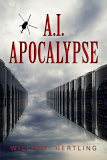I tried to give Facebook a chance. I did, really.
I created an account. I friended some people. I accepted friend requests. I joined some groups. I “liked” some company pages. I created a couple of company pages and managed them. I checked in on my news feed once a day or so.
In the end, it just didn’t work for me. For a while I couldn’t figure out why, but then I realized what my beef was with Facebook. I’m not a user, I’m the product.
Facebook and Mark Zuckerberg report to their investors and shareholders, not to me. They’re obligated to provide their owners with a return on their investment. So long as that’s true, Facebook will be under pressure to make money. (Shocking, right?)
In case you haven’t figured this out, Facebook makes money from advertisers, not by creating services for you and me. Yes, you and me are an integral part of the Facebook product since we and our data are how Facebook makes its money – by packaging us and selling us to the highest bidder. So long as Facebook makes money through advertisers, they will continue to exploit their user base by encouraging over sharing through more and more relaxed and/or confusing privacy controls and settings. Basically, I don’t trust Facebook because their business model is based on making money by exploiting users and their data.
For what it’s worth, just because I have an issue with Facebook doesn’t mean I think Mark Zuckerberg is a bad person. In fact, I believe he has the best intentions in his heart, but his board and investors are directing him to chase money rather than serving users and making investments in long-term technologies. A look at some recent Facebook decisions around their mobile strategy are just one example.
Facebook’s initial strategy for mobile was to develop hybrid apps based on HTML5, an emerging web technology that would allow for universal apps across operating systems – iOS, Android, Windows Phone, and BlackBerry. However, under the guise of performance, Facebook moved to proprietary apps. To me, the real reason for the change was to create a proprietary system that would allow them to isolate users, and I am not alone in my thinking. In order to chase a short-term gain in users and revenue, Facebook gave up the chance to be a technology leader.
Because Facebook is not interested in the long-term, I don’t trust them with my data, or with my most valuable asset – my time. For a couple of years, I managed brand pages on Facebook, investing time and effort trying to connect with potential users of my service. Facebook made it an inviting option by allowing you to set up a brand page for free and then allowing you to connect with users who “liked” your page. However, even those rules changed when Facebook realized it could wring more money out of companies by making them pay to promote their posts.
This focus on the short-term is why I feel that Facebook will not survive the long haul. Sure, they’ve created a useful service, but it is not an essential internet service, and their desire to chase short-term dollars over long-term technology leadership will leave them susceptible to what I like to call the “night club effect“.
So while there’s no doubt that Facebook has been the biggest success of the social networking space, I’ve given up on the service and don’t miss it. I even see my kids spending less and less time there, which doesn’t bode well for Facebook since teenagers tend to be the leading indicators of the next big social networking site (which is Twitter these days, by the way). I’ve even given up on it for the brands I manage. Maybe I’m missing something by not being there, but it sure doesn’t feel like it, and I have no plans to go back anytime soon.


